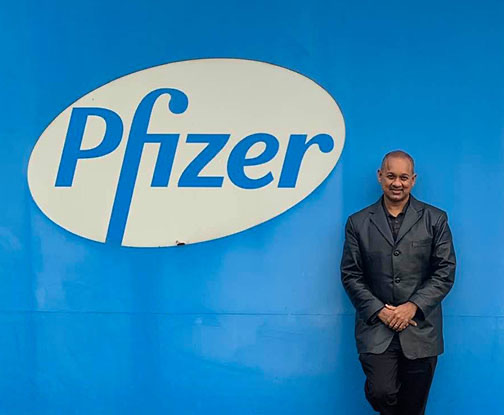The rapid development of COVID-19 vaccines has caused much wariness and concern, but Guyanese-born scientist Vidia Roopchand, who is employed with Pfizer Inc is assuring that all safety standards were observed during the development of the Pfizer-BioNTech vaccine.
Roopchand is one of several scientists who were involved in the development of the Pfizer-BioNTech vaccine called BNT162b2.
The announcement of effective COVID-19 vaccines was a glimmer of hope to many but persons are unsure about the safety of the vaccination given its rapid development.
During an interview with Stabroek News earlier this month, Roopchand stated that the COVID-19 pandemic represents an unparalleled crisis in recent history and has been a challenge to science, but safety has always been the number one priority for Pfizer.
“Safety was, is, and will always be our number one priority in vaccine research and development. Even though we moved with extraordinary speed, high quality and safety standards were preserved throughout development. And as in all our work to advance investigational vaccines, we worked closely with clinical trial sites and experienced investigators and regulatory agencies worldwide. We took all of the regulatory and operational steps that we would normally take for all of our vaccine trials to maintain the highest standards in our development process and did not cut any corners. In addition, an independent safety data monitoring committee is in place to evaluate the safety of our vaccine candidate,” Roopchand assured.
Roopchand noted that Pfizer and BioNTech began collaborating in 2018 to develop a vaccine for influenza and extended the collaboration in March 2020 with the launch of “Project Lightspeed” to develop a vaccine for COVID-19.
He disclosed that the Phase 1 clinical trials began in the US and Germany in April and were designed to evaluate the safety, tolerability, and potential efficacy of up to four mRNA vaccine candidates and to select which vaccine candidate and dose should be taken forward for future clinical study.
One vaccine candidate – BNT162b2, was selected for the phase 3 clinical trial, which began in July with more 44,000 participants. He added that the final efficacy analysis in the ongoing Phase 3 study demonstrated a vaccine efficacy rate of 95% in participants without prior COVID-19 infection and also in participants with prior COVID-19 infection. He noted that the effectiveness of the vaccine was consistent across age, gender, race and ethnicity demographics. “The observed efficacy in adults over 65 years of age was over 94%,” he said. He added that BNT162b2 was selected based on an extensive review of preclinical and clinical data from Phase 1 and 2 clinical trials.
In addition, he said, the Pfizer-BioNTech team accelerated the development process by doing some operational steps in parallel rather than sequentially as would normally be done. He explained that the investigator site selection process began earlier than normal and more persons were employed to give operations the support and flexibility needed. He added that they also invested upfront in certain areas, such as manufacturing, in order to be ready to execute as decisions were made.
Further, he noted that in the usual drug development journey, the process of preparing regulatory data packages to submit to the FDA and waiting for its response often takes months but due to the fact that COVID-19 is a global pandemic, regulators have responded to the data very quickly to help keep trials running as quickly as possible.
“When COVID-19 emerged, it was a logical step for BioNTech and Pfizer to collaborate in this effort. The BioNTech and Pfizer scientists worked in close collaboration to design BNT162b2 which eventually became the vaccine.
I led the cell culture group to provide the cells which were used to confirm that the m-RNA was expressing the correct protein. I also assisted with some of the immunological assays to evaluate the response in the preclinical studies,” he added.
Meanwhile, it was revealed that data from this study, including longer term safety, comprehensive information on duration of protection, efficacy against asymptomatic SARS-CoV-2 infection, and safety and immunogenicity in adolescents 12 to 17 years of age, will be gathered in the upcoming months.
Additional studies are planned to evaluate BNT162b2 in pregnant women, children younger than 12 years, and those in special risk groups, such as the immunocompromised.
Roopchand added that persons who receive the Pfizer-BioNTech COVID-19 vaccine are encouraged to continue to take all COVID-19 safety precautions.
It is yet to be determined the duration of immunity after immunization with an effective COVID-19 vaccine.
Based on evidence from clinical trials, Pfizer-BioNTech said that the vaccine they have developed is 95% effective at preventing laboratory-confirmed COVID-19 illness in people without evidence of previous infection. Several countries including the United Kingdom and the United States have since approved the Pfizer vaccine for emergency use.
According to Health Minister Dr Frank Anthony, Guyana will be accessing a COVID-19 vaccine for three per cent of its population through COVAX.
However, as of now it is uncertain when or which COVID-19 vaccine will be accessed by Guyana although it was suggested that the vaccine will be made available to Guyana in the second quarter of the New Year. Nevertheless, Anthony said that preparatory steps are underway to ensure that the country is ready for a vaccine when it becomes available.

